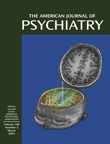Genetic Linkage in Schizophrenia
To the Editor: I would like to comment on the article by Lynn E. DeLisi, M.D., et al. (1) presenting a genome-wide scan for linkage to chromosomal regions in individuals with schizophrenia or schizoaffective disorder. The article refutes previous linkage studies for schizophrenia, noting that “no linkage appears to be consistently replicable across large studies” (p. 803). Additionally, the authors questioned whether “the genetic contribution to this disorder is detectable by these strategies” (p. 803). Another recent article demonstrated that genome-wide scans are very prone to false positive results (2). Perhaps these two articles can put to rest the vicious cycle of genome-wide scans refuting previous linkage findings while creating more false positives to be refuted by the next genome-wide scan (although the authors leave that cycle intact). At the very least, I suggest that any such studies in the future include the use of a comparison group to compare the number of false positives within that study group.
At what point is it safe to say that no such linkages are likely to be found for schizophrenia or other mental disorders? The authors’ suggestion that the genetic contribution of schizophrenia may be “epigenetic, i.e., related to gene expression rather than sequence variation” (p. 803) is intriguing, but I think it also opens the door for another possibility. Perhaps schizophrenia and other mental disorders, even though shown to be heritable in twin studies, are not actually genetic. This, of course, is paradoxical and would require a paradigm shift in our understanding of mental illness and genetics. But the fact of the matter is that the evidence is pointing in that direction, despite what our current scientific bias leads us to believe. The mind is a complex thing, and our attempts to reduce it to genetic loci or epigenetic expression is surely an oversimplification, if not a complete misrepresentation.
1. DeLisi LE, Shaw SH, Crow TJ, Shields G, Smith AB, Larach VW, Wellman N, Loftus J, Nanthakumar B, Razi K, Stewart J, Comazzi M, Vita A, Heffner T, Sherrington R: A genome-wide scan for linkage to chromosomal regions in 382 sibling pairs with schizophrenia or schizoaffective disorder. Am J Psychiatry 2002; 159:803-812Link, Google Scholar
2. Goring HH, Terwilliger JD, Blangero J: Large upward bias in estimation of locus-specific effects from genomewide scans. Am J Hum Genet 2001; 69:1357-1369Crossref, Medline, Google Scholar



